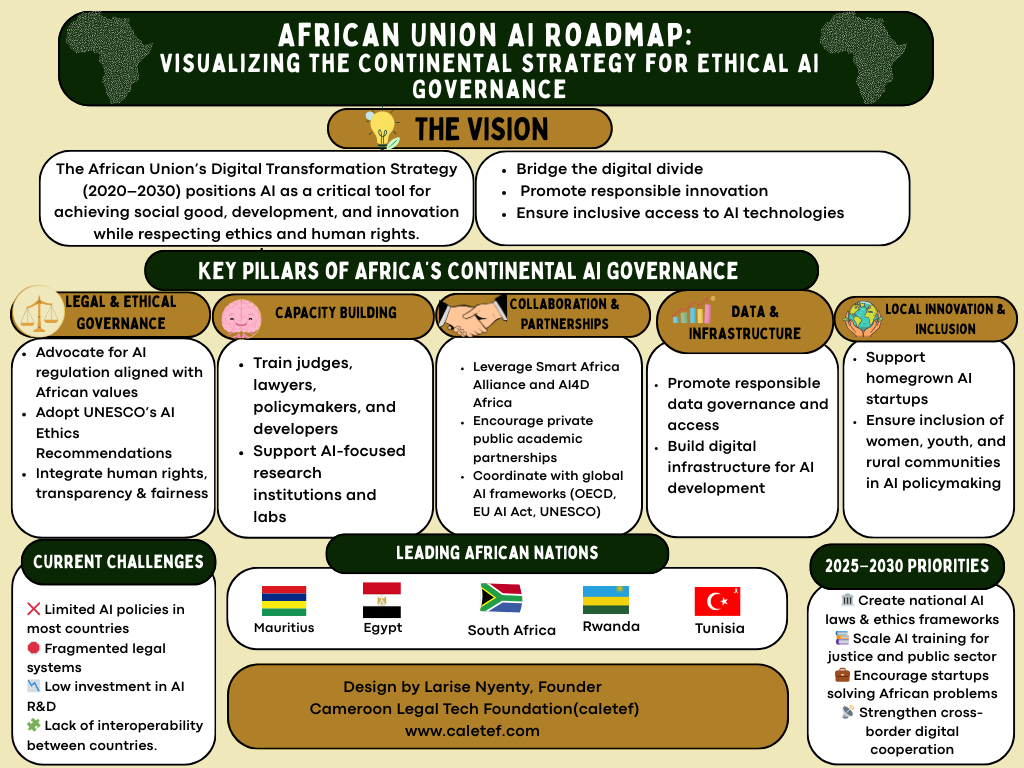Artificial Intelligence (AI) is changing industries fast. It’s no longer futuristic. It’s already helping courts, hospitals, banks, and governments work smarter.
But in Cameroon, our justice system still relies heavily on paper. Files are moved by hand. Court records are mostly stored in folders. Many judgments are not digitized or searchable. This slows down justice. It creates gaps. It increases the chances of case files going missing or getting tampered with.
Why This Matters Now
Across the continent, countries are thinking more seriously about AI. In July 2024, the African Union adopted a Continental AI Strategy. It lays out how African countries can use AI in areas like governance, education, and justice, as well as how to do it safely and ethically.
The strategy urges countries to:
- Build digital infrastructure
- Create public datasets
- Train people in AI and digital tools
- Regulate AI to protect rights
- Promote local innovation
Check out a cheat sheet below of the African Union Artificial Intelligence Roadmap.

Our Justice System Is Still Manual
Cameroon’s justice system is not yet ready for any of that. And here’s why Most courts in Cameroon do not have electronic case tracking.
Most laws are not published in structured, machine-readable formats.
Judgments are often not available online.
There’s no unified legal database for public access or research.
So while AI tools are helping courts in places like Rwanda and Kenya to manage caseloads, detect fraud, or predict delays, in Cameroon, we’re still flipping through case files.And we cannot skip the basics. AI needs structured digital data. We don’t have that yet in our justice system.
Meanwhile, Other Sectors Are Moving Forward
Interestingly, the financial sector in Cameroon is embracing digital change.
On 5th June 2024, the Ministers of Posts & Telecommunications and Finance co-chaired the first Scientific Days of the National Economic and Financial Committee in Yaoundé. The theme: “Transformation of the Financial System through Digital Innovations: Stakes and Perspectives for Cameroon.”
Key highlights from that meeting:
- AI is already being used in finance for fraud detection, risk management, and big data analytics
- Open Banking is being explored to improve customer experience and increase access
- The government has a national strategy focused on digital infrastructure, digital entrepreneurship, and regulation
- Cybersecurity is a top concern, especially as financial data becomes more exposed
Minister Minette Libom Li Likeng made it clear: “Cameroon does not want to be left behind.” She acknowledged that the digital economy is now an essential driver of growth and stability — not just in finance but across all sectors.If this mindset is now present in the financial system, why can’t it be replicated in the justice sector?
The Risk of Doing Nothing
Here’s what’s at stake if we delay justice digitization:
- Case delays will worsen as files pile up
- Corruption risks will increase with lack of traceability
- Citizens will continue to struggle to access court records or understand case progress
- AI-ready legal innovation — such as smart legal research tools, digital case tracking, and predictive analytics — will remain impossible
- Trust in the justice system will weaken
While other African countries start testing AI in courts, Cameroon risks falling far behind. Not just in technology but in fairness, access, and speed of justice.
What Should Be Done
We don’t need to start with AI. We need to start with digital basics in the justice system:
- Digitize laws, judgments, and case records
- Introduce electronic case management systems in courts
- Train magistrates, lawyers, and clerks on digital literacy
- Create a national open legal data platform
- Work with local legal tech actors to test tools like search engines for legal texts
- Link these steps to the AU AI Strategy and national digital economy efforts
These actions are realistic. They are not expensive compared to the cost of inefficiency. And they would unlock long-term gains.
A Lesson from Finance
The financial sector is not perfect. But it is showing the way.
Officials now talk openly about AI, open banking, risk management, and data protection.
Workshops are happening. Regulations are being debated. Infrastructure is being funded.Justice must not be left behind.
Final Thoughts
You can’t build the justice system of the future on paper.
You can’t prepare for AI when most legal processes are still manual.Cameroon has shown it can lead in digital finance. It can do the same in law , but only if it acts now.
🟢 If you’re building tools, running legal projects, or advocating for justice digitization in Cameroon, get in touch with the Cameroon Legal Tech Foundation (CALETEF).
Together, we can build a legal system that works and lasts.




